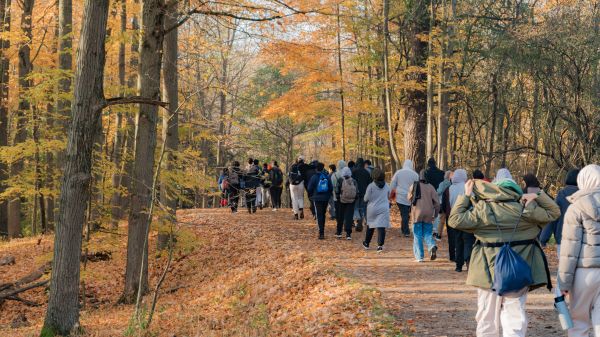The Greening Our Communities Toolkit

Green Ummah is a nationally incorporated nonprofit organization seeking to create an environmental and environmental justice movement within the Muslim community. Green Ummah was created in 2020 by youth advocates for the environment who found a gap in the Canadian Muslim community as it pertains to environmental consciousness. Since our inception, Green Ummah has expanded the team to include five coordinators, amassed a volunteer base of 40+ volunteers across the country, and built strategic partnerships with organizations such as Nature Canada, Green Teacher and the Outdoor Learning Store.
At Green Ummah, we highly value youth empowerment. When we started the organization, a key discussion in our formative days was determining how best to ensure that we can be a platform for Muslim youth interested in getting further engaged with the environment. What we came to understand early on was that Muslim youth cared about the environment as they are constantly bombarded with ‘doom and gloom’ news of environmental catastrophes. However, Muslim youth felt alienated from the movement for two key reasons:
- INFORMATION: they were not able to make the connection between what they see happening with the environment and their religious or spiritual upbringing; and,
- ACCESS: they don’t see themselves belonging in the environmental movement and even have issues with accessing nature.
Once these issues were highlighted, Green Ummah diverted energy and resources into tackling them. The resulting product was the Greening Our Communities Toolkit (“the Toolkit”). The Toolkit is now a two-module, ready-to-teach package. The two packages include Islam & the Environment and Worldviews, Justice & the Environment. These packages take an asset-based approach, meeting students at their level. Furthermore, the packages are solution-driven, each containing “Take Action” activities that give agency to the students to innovate and think of creative solutions to the environmental problem. Teachers receive teaching guides, teaching material, activities, assessments, and rubrics. Some activities are nature-based to encourage an innovative learning style. This material is taught between Grades 7–12 in Ontario, through private Islamic and secular public school boards, to be later expanded to different provinces.
The goal for the Toolkit is to create young environmental changemakers. This is accomplished through the teaching of the packages and student engagement with the material. Consequently, our partnership with Nature Canada allows for outdoor learning elements to be built into the toolkit. Through our partnership, we take students to National Wildlife Areas or Migratory Bird Sanctuaries, or alternatively, to local nature spaces. Our data shows that by removing barriers to accessing nature by taking students directly into nature spaces, students are encouraged to think differently about nature and this fosters a stronger relationship between students and the environment.
The Toolkit benefits students and the wider community around them. The Toolkit has built-in elements encouraging students to discuss the connections they learn about with their caregivers. Furthermore, the Take Action activities also include things like a Letter Writing Activity for which students will write a letter to a leader in the community (at the school, MP, MPP, Councillor, local business, etc.) encouraging them to enact more environmentally friendly policies.
The Toolkit accomplishes three key things:
a) Makes the connection, likely for the first time for students, between Islam and the environment or colonialism, justice and the environment;
b) Implements some outdoor learning thus breaking barriers BIPOC youth may face in accessing nature and reimagining how students think of local nature spaces;
and, c) Encourages students to think outside the box for environmental solutions and provides them with the tools to become changemakers.
The Toolkit is in its second full year of implementation, with 25 classes across Ontario in the pipeline to take it before the end of the 2022–2023 school year. We hope for similar results to our pilot where our surveys showed that 96% of students felt comfortable recognizing environmental concerns in Canada, 93% of students were able to explain Islamic ethics as they relate to sustainable living and environmental protection and 96% of students were able to define racism, structural racism, and environmental racism in a global and Canadian context. However, the impact of the Toolkit is best captured through the words of our teachers and students:
"I enjoyed it because it gave me a different perspective as rather than learning from an article or video, I also found it much more calming to sit and learn in my surroundings in nature rather than sitting in a closed classroom learning from a screen." —Grade 9 student, March 2022
“The letter writing activity was very effective and had students thinking about how they can explain and make connections to the material from the modules to someone in a position to potentially effect change. It was also a good way to incorporate literacy and writing into the curriculum.” —Grade 9 teacher, December 2021



Comments
Thanks for sharing, Aadil! Grateful for the work you do and you sharing about it with our eePRO community!